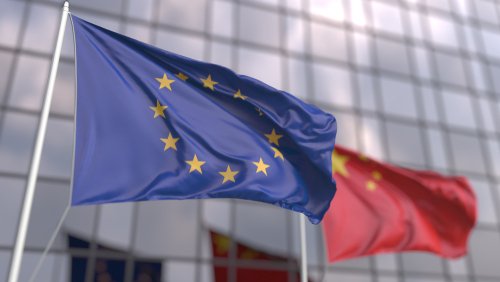Belgium (Brussels Morning) The relationship between China and the European Union, two titans of the global stage, is a polymorphic dance performed on a tightrope stretched over an abyss. While economic ties flourish, fueled by a trade volume exceeding €600 billion annually, ideological divergences and geopolitical complexities cast shadows, threatening to disrupt this delicate equilibrium. Understanding this intricate dynamic is crucial, not just for its impact on the two actors, but for its wider ramifications on the global order.
China’s rise to power is the backdrop to this complex picture. Its dazzling transformation into an economic and military colossus has turned the established international order upside down, an order dominated by the West for centuries. The EU, for its part, is seeking to maintain its influence and defend its democratic values in this emerging multipolar world. This power shift creates fertile ground for tensions, but also opportunities.
At the core of their economic embrace lies a mutually beneficial exchange. The EU, as China’s largest trading partner, acts as a vital market for Chinese exports and a source of cutting-edge technology. China, in turn, satisfies the EU’s insatiable demand for manufactured goods and offers a vast consumer market. However, this economic tango is not without discordant notes. The EU raises concerns about unfair trade practices, restricted market access in China, and the specter of intellectual property theft, while China bristles at accusations of economic coercion and resists calls for greater market liberalization.
Beyond the economic realm, the ideological chasm between the two giants widens. The EU, a staunch advocate for human rights, democracy, and the rule of law, finds itself at odds with China’s authoritarian system and its human rights record. The bitter memory of historical events and differing cultural perspectives further aggravate these tensions. China, on the other hand, views Western criticism as hypocritical interference in its internal affairs and promotes its own model of governance as a viable alternative. These ideological disparities often translate into friction, discouraging cooperation on global issues like climate change, security, and nuclear non-proliferation.
Further complicating the landscape is the emergence of the “Clean Path” strategy, a joint effort by the US and EU to reduce their dependence on critical technologies from China. This initiative, driven by concerns over national security and intellectual property theft, aims to diversify supply chains and promote alternative sources for strategic technologies. While presented as a purely economic move, it is viewed by China with suspicion, as it is seen as an attempt to contain its technological rise and restraint its economic influence.
Under the dictate of the EU “Clean Path”, and in the realm of 5G technology, the EU introduced the 5G Toolbox, a comprehensive strategy to secure 5G networks across the bloc. While not specifically targeting China, the strategy includes rigorous security measures for telecom equipment suppliers, which could affect companies like Huawei and ZTE. The EU encourages member states to assess the risk profiles of suppliers and to avoid high-risk suppliers in critical and sensitive parts of the 5G infrastructure.
Despite these challenges, both the EU and China recognize the necessity of engagement. The EU, seeking a “strategic partnership” with China, walks a tightrope between cooperation and competition, aiming to crop the economic benefits while upholding its values. China, advocating for “mutual respect” and “win-win cooperation”, seeks a more equal positioning in the global arena and a greater say in shaping the international order.
The future trajectory of this intricate relationship swings on the ability of both sides to navigate the labyrinth of competing interests. Open communication, addressing concerns with mutual respect, and fostering understanding will be the guiding lights on this path. The success of this partnership will not only shape the fortunes of two major powers but also hold significant implications for the global political and economic landscape.
However, the path forward is fraught with challenges. The “Clean Path” strategy adds another layer of complexity, potentially pushing China further away and raising the prospect of a decoupling of the world’s two largest economies. Finding common ground on issues like human rights, intellectual property protection, and market access will be critical in building trust and encouraging a more stable and prosperous relationship.
Ultimately, the China-EU relationship is a microcosm of the broader geopolitical landscape, where established powers struggle with a rising China and the quest for a new global order. Whether the two sides can bridge their ideological dichotomy, navigate the complexities of economic interdependence, and cooperate on global challenges will have profound consequences for the world we live in. The tightrope walk continues, and the world watches in agony, waiting to see if the actors can maintain their balance or dive into the abyss below.
Opinions expressed in the op-ed section are solely those of the individual author and do not represent the official stance of our newspaper. We believe in providing a platform for a wide range of voices and perspectives, even those that may challenge or differ from our own. As always, we remain committed to providing our readers with high-quality, fair, and balanced journalism. Thank you for your continued support.Sincerely, The Brussels Morning Team




